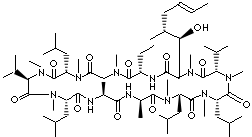PRODUCT IDENTIFICATION

H.S. CODE
TOXICITY
CLASSIFICATION
PHYSICAL AND CHEMICAL PROPERTIES
Insoluble (Soluble in ethanol, organic solvents)
AUTOIGNITION
NFPA RATINGS
REFRACTIVE INDEX
Stable under ordinary conditions
EXTERNAL LINKS & GENERAL DESCRIPTION
Cyclosporin A (CAS No. 59865-13-3) is a strong immunosuppressant agent (Laupacis et al., 1982; Wagner, 1983) used for the treatment of kidney, liver, heart, and other organ transplantation; rheumatoid arthritis; and psoriasis (Faulds et al., 1993). Cyclosporin A is a non-polar cyclic polypeptide consisting of 11 amino acids produced by multiple fungal species (Petcher et al., 1976; Krensky et al., 2006; Budavari et al., 1996). Cyclosporin A is a white to off white crystalline solid that is slightly soluble in water and soluble in organic solvents (Budavari et al., 1996). (http://www.vcu.edu/)
Cyclosporin (brand names Sandimmun and Neoral) is a medicine used to treat rheumatoid arthritis and other rheumatic conditions such as systemic lupus erythematosus (lupus/SLE) and polymyositis (muscle inflammation). Cyclosporin is used in rheumatoid arthritis when other treatments have been unsuccessful. It is also used to prevent the rejection of transplanted organs. Cyclosporin is an immunosuppressive medicine, which means that it works by reducing the activity of the immune system. In rheumatoid arthritis, this action helps to reduce inflammation and thus reduce pain and swelling. It also limits damage to the joints and helps to prevent disability in the long term. Because cyclosporin reduces the damage to the joints, rather than just relieving the pain, it belongs to the group of medicines called disease modifying antirheumatic drugs (DMARDS). (http://www.rheumatology.org.au/)
Discovery of immunosuppression by cyclosporin in 1976 is attributed to J. F. Borel, see Figure 5. In 1983 cyclosporin was approved for clinical use to prevent graft rejection in transplantation. Most of the surgical problems of allograft transplantation had already been solved by this time. Since 1961 the standard method of achieving immunosuppression had been a combination of azathioprine and corticosteroids. Azathioprine inhibits cell proliferation non-selectively. Its main unwanted side effect is depression of the bone marrow, other toxic effects include increased susceptibility to infections, a mild hepatotoxicity, skin eruptions, nausea and vomiting. Corticosteroids inhibit T lymphocytes and have an anti-inflammatory effect. Side effects include diabetes, avascular necrosis of bones and increased tendency to infections. Cyclosporin was the strongest immunosuppressor to be discovered so far, it also overcame many of the risk factors associated with azathioprine and is relatively non-toxic to bone marrow. With the introduction of cyclosporin patient morbidity fell. It became possible to transplant organs with a one year success of 20% higher than previously, and to transplant organs successfully which previously had only been done in experimentation: the heart, the liver, the lung and combined heart lung transplants. As well as transplantation, cyclosporin has been used in most autoimmune diseases. In the 1980’s experimental treatment with cyclosporin of insulin-dependent diabetes mellitus, inflammatory bowel disease, chronic asthma, atopic dermatitis, aplastic anaemia and psoriasis supported evidence of their T cell mediated nature. (http://www.world-of-fungi.org/)Cyclosporins
|
Product |
CAS RN. |
|
Cyclosporin C |
59787-61-0 |
| Cyclosporine | 59865-13-3 |
| Dihydrocyclosporin A | 59865-15-5 |
| Isocyclosporin A | 59865-16-6 |
| Dihydrocyclosporin C | 63556-15-0 |
| Dihydrocyclosporin D | 63775-91-7 |
| Isocyclosporin D | 63775-93-9 |
| Cyclosporin B | 63775-95-1 |
| Cyclosporin D | 63775-96-2 |
| Geclosporin | 74436-00-3 |
| Cyclosporin | 79217-60-0 |
| Cyclosporin F | 83574-28-1 |
| Cyclosporin H | 83602-39-5 |
| Cyclosporine A acetate | 83602-41-9 |
| 8-(N-Methylalanine)cyclosporin A | 108466-41-7 |
| 11-(N-Methyl-L-alanine)cyclosporin A | 111710-61-3 |
| N-Methyl-4-((E)-2-butenyl)-4,4-dimethylthreonine cyclosporin A | 114865-22-4 |
| Cyclosporin lactam(3,4) | 115141-85-0 |
| Valspodar | 121584-18-7 |
| 8-Hydroxy-6,7-dihydro-(4-(2-butenyl)-4,N-dimethylthreonine)cyclosporin | 121886-75-7 |
| N(epsilon)-(Diazotrifluoroethyl)benzoyl-lys(8)-cyclosporin | 126871-92-9 |
| 9-Hydroxy-9-desmethylcyclosporine | 132362-39-1 |
| Dansylisocyclosporin A | 134998-06-4 |
| Oxeclosporin | 135548-15-1 |
| 9-(N-Methyl-L-isoleucine)cyclosporin A | 143205-42-9 |
| 4-(L-Leucine-7-L-threonine-10-L-leucine)cyclosporin A | 153049-50-4 |
| Tricyclic cyclosporin A | 153475-57-1 |
| 6-(Threo-3-hydroxy-N-methyl-L-leucine)cyclosporin A | 154334-72-2 |
| N-Methyl-valyl-4-cyclosporin A | 159605-70-6 |
| 5-(N-Methyl-D-valine)-6-(threo-3-hydroxy-N-methyl- L-leucine)cyclosporin A | 166733-03-5 |
| 6-((2S,3R,4R)-3-Hydroxy-4-methyl-2-(methylamino)-6, 8-nonadienoic acid) cyclosporin A | 515814-00-3 |
APPEARANCE
ASSAY
LOSS ON DRYING
2.0% max